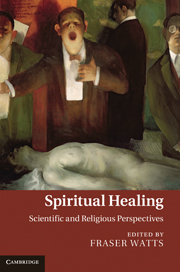Book contents
- Frontmatter
- Contents
- List of figures
- List of contributors
- Preface
- 1 Conceptual issues in spiritual healing
- 2 The historical Jesus and healing: Jesus' miracles in psychosocial context
- 3 The theology of spiritual healing
- 4 Healing the spirit: mystical Judaism, religious texts and medicine
- 5 Conceptualizations of spiritual healing: Christian and secular
- 6 The psychodynamics of spiritual healing and the power of mother kissing it better
- 7 Spiritual healing in the context of the human need for safeness, connectedness and warmth: a biopsychosocial approach
- 8 Modelling the biomedical role of spirituality through breast cancer research
- 9 Spirituality and health: assessing the evidence
- 10 Relating spiritual healing and science: some critical reflections
- 11 Concluding integration
- Bibliography
- Index
3 - The theology of spiritual healing
Published online by Cambridge University Press: 04 February 2011
- Frontmatter
- Contents
- List of figures
- List of contributors
- Preface
- 1 Conceptual issues in spiritual healing
- 2 The historical Jesus and healing: Jesus' miracles in psychosocial context
- 3 The theology of spiritual healing
- 4 Healing the spirit: mystical Judaism, religious texts and medicine
- 5 Conceptualizations of spiritual healing: Christian and secular
- 6 The psychodynamics of spiritual healing and the power of mother kissing it better
- 7 Spiritual healing in the context of the human need for safeness, connectedness and warmth: a biopsychosocial approach
- 8 Modelling the biomedical role of spirituality through breast cancer research
- 9 Spirituality and health: assessing the evidence
- 10 Relating spiritual healing and science: some critical reflections
- 11 Concluding integration
- Bibliography
- Index
Summary
In this chapter I will consider the question of spiritual healing from the perspective of a contemporary theologian. Theology inherited a very robust notion of spiritual healing, since the Christian scriptures provide multiple accounts of the healing of body, soul (psyche) and spirit. It likewise remained a crucial premise throughout most of the Christian tradition that God acts, and that among God's actions are sometimes acts of miraculous healing.
This theological approach is in accord with the opening chapter by Fraser Watts. In one sense the approach of this paper can be viewed as a direct response to Watts' invitation. He notes that theological and scientific approaches to spiritual healing are complementary, though his chapter is not primarily concerned with developing a theology of healing. In order to understand spiritual healing scientifically, he calls for an ‘emancipated ontology’, a broader understanding of reality than is provided by the natural sciences, and which includes the paranormal. I accept here the challenge of formulating this broader view of reality, though I do so as a theologian rather than as a student of paranormal phenomena. I am also happy to follow Watts in his attempt to construe spiritual healing in a non-dualistic fashion. He looks for ‘a subtle interpenetration of the natural and the spiritual, rather than … a sharp disjunction between them’. Watts understands spiritual healing to be ‘holistic’, since it ‘involves body, mind and spirit’.
- Type
- Chapter
- Information
- Spiritual HealingScientific and Religious Perspectives, pp. 44 - 63Publisher: Cambridge University PressPrint publication year: 2011
- 2
- Cited by



